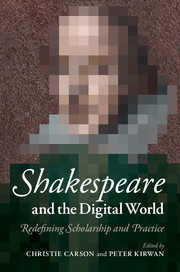Book contents
- Frontmatter
- Contents
- Notes on contributors
- Acknowledgements
- Shakespeare and the digital world
- Part I Defining current digital scholarship and practice
- Part II Defining current digital scholarship and practice
- Half-time: A pause for reflection
- 9 All’s well that ends Orwell
- Part III Redefining the boundaries and practices of Shakespeare studies online
- Part IV Redefining the boundaries and practices of Shakespeare studies online
- Index
- References
9 - All’s well that ends Orwell
Published online by Cambridge University Press: 05 July 2014
- Frontmatter
- Contents
- Notes on contributors
- Acknowledgements
- Shakespeare and the digital world
- Part I Defining current digital scholarship and practice
- Part II Defining current digital scholarship and practice
- Half-time: A pause for reflection
- 9 All’s well that ends Orwell
- Part III Redefining the boundaries and practices of Shakespeare studies online
- Part IV Redefining the boundaries and practices of Shakespeare studies online
- Index
- References
Summary
Act 1
‘On January 24th, Apple Computer will introduce Macintosh. And you’ll see why 1984 won’t be like 1984.’ With these words, spoken in a voice-over and scrolling down the screen, a now-famous advertisement comes to a close, leaving a huge, mostly American audience wondering what had just interrupted Super Bowl XVIII. Produced by Apple, budgeted at $900,000, $750,000, or $400,000 (depending on whom you cite), and directed by filmmaker Ridley Scott, fresh from triumphs with Blade Runner (1982) and Alien (1979), ‘1984’ was sixty seconds of sci-fi dystopia that Steve Jobs hoped would ‘stop people in their tracks’ (quoted by Isaacson, 2011: 162). It would do so by casting Apple, and the people whom Apple would empower, as destroyers of an Orwellian Big Brother. But as Walter Isaacson reports, Apple’s Big Brother wasn’t Orwell’s, a totalitarian regime; it was Big Blue, the IBM Corporation. ‘It is now 1984,’ Steve Jobs intoned at the launch of the new machine, and ‘it appears that IBM wants it all…[and] is aiming its guns at its last obstacle to industry control, Apple. Will Big Blue dominate the entire computer industry? The entire information age? Was George Orwell right?’ (quoted by Isaacson, 2011: 169).
Ironies abound in this casting, not least of which is that, at the launch, Jobs addressed the situation not of citizens, as the advertisement implied, nor even of consumers, but of retailers who ‘fear an IBM-dominated and -controlled future,’ a future that would reduce profits (Isaacson, 2011: 169). And equating Big Brother with Big Blue allowed Apple to conflate ‘capitalist competition…with democracy and freedom’ and thus to suggest that what it offers isn’t capitalist competition at all, but ‘democracy and freedom’ to all of us (Stein, 2002: 183).
- Type
- Chapter
- Information
- Shakespeare and the Digital WorldRedefining Scholarship and Practice, pp. 115 - 126Publisher: Cambridge University PressPrint publication year: 2014
References
- 1
- Cited by

